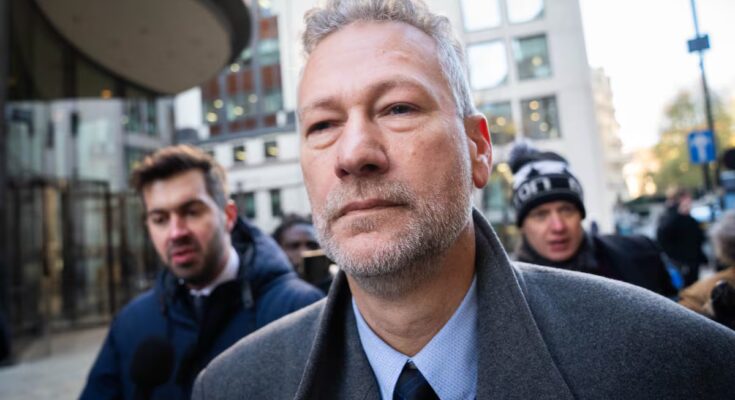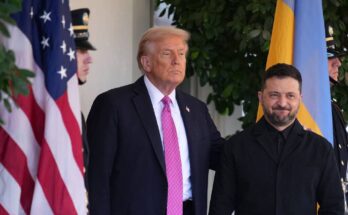The suspicions were always there. Nigel Farage, the far-right British populist politician who promoted the victory of Brexit like no other and who poisoned the public debate in the United Kingdom with his xenophobic speech, has always turned out to be too friendly with Vladimir Putin’s Russia. This Friday, the sentencing to more than ten years in prison of one of his most loyal MEPs and collaborators in recent years, Nathan Gill, for accepting bribes from a Ukrainian oligarch allied with the Russian president, has cast serious doubt on the loyalty and contribution to national security of Farage and his forces.
Gill, who became leader of the Reform UK party (Farage’s new political formation, with which he finally managed to gain access to the House of Commons) in the Welsh region, accompanied the populist politician throughout his career. He was a member of the same founder’s other two previous parties, UKIP and the Brexit Party, and thanks to them he managed to become an MEP in Strasbourg, with the mission of destroying the EU institutions from within.
The convicted man admitted his guilt in eight corruption crimes, committed between December 2018 and July 2019, for which he pocketed more than 45,000 euros. Gill received payments from Ukrainian oligarch Oleg Voloshin, a Putin ally whom Western intelligence now locates in Moscow. The MEP pledged to repeat arguments based on Voloshin’s dictates in his speeches to the European Parliament, with the aim of defending the Kremlin’s arguments in the community assembly. All the ideas he presented were excuses to justify the Russian aggression against Ukraine that eventually occurred.
The investigation into Gill, who ended up confessing his guilt last September, was conducted by the counter-terrorism department of the London Metropolitan Police, aware that actions such as those carried out by the then MP, in the service of a country now considered an enemy by the United Kingdom government, represented an attack on national security.
British authorities were put on Gill’s trail by the American FBI, which intercepted Voloshin’s phone and captured the Ukrainian oligarch’s coded messages to the MEP, which clearly implied the payment of bribes for services provided.
Farage, paid to collaborate on television in the service of the Kremlin, Russia today; who went so far as to define Putin as a hero he admires; and those who blamed NATO and its eastward expansion for the invasion of Ukraine were quick to distance themselves from the “Gill case”. His reformist party today expressed a categorical rejection of the activity of one of its most important members. “Their actions are reprehensible, treasonous and unforgivable. We express our satisfaction with the sentence that justice has imposed,” the group said in a statement.
All polls highlight the leadership of Reform, which could hypothetically win the general elections. Farage’s party has taken control of the UK’s political agenda, with the Labor government and Conservative opposition desperate to copy his populist rhetoric, especially on immigration.
Gill’s conviction gave respite to the Starmer executive, who unceremoniously went for Farage’s jugular. The actions for which the MEP was jailed, Secretary of State for Security Dan Jarvis said in parliament, “are a betrayal of our country, our people and our national security”.
The Labor Party will not let the far right escape the noose and is calling for an internal party investigation into what happened.
“Allowing money to corrupt your moral compass is a grave betrayal of the trust the electorate has placed in you,” said Judge Bobby Cheema-Grubb, of the Central Criminal Court of England and Wales (known as The Old Baileyin London). “His criminal behavior has consequences that go beyond his own honor, which has been irreparably tarnished.”
Although Farage wanted to distance himself from Gill and pretend he barely knows him, several Reform sources were quick to confirm to the British media that the friendship between the two grew out of their first steps in politics and shared hours in the European Parliament. Gill, a Mormon with strong religious beliefs, was not one of the party’s brightest politicians, but he professed steadfast loyalty to the leader. Precisely because of his lack of enlightenment and fanaticism, he was an easy prey for Putin’s entourage, who managed to use him as a tool to launch their own messages into the European debate.



